Unit 5 Our School Life单元复习学案(附答案)
文档属性
| 名称 | Unit 5 Our School Life单元复习学案(附答案) | 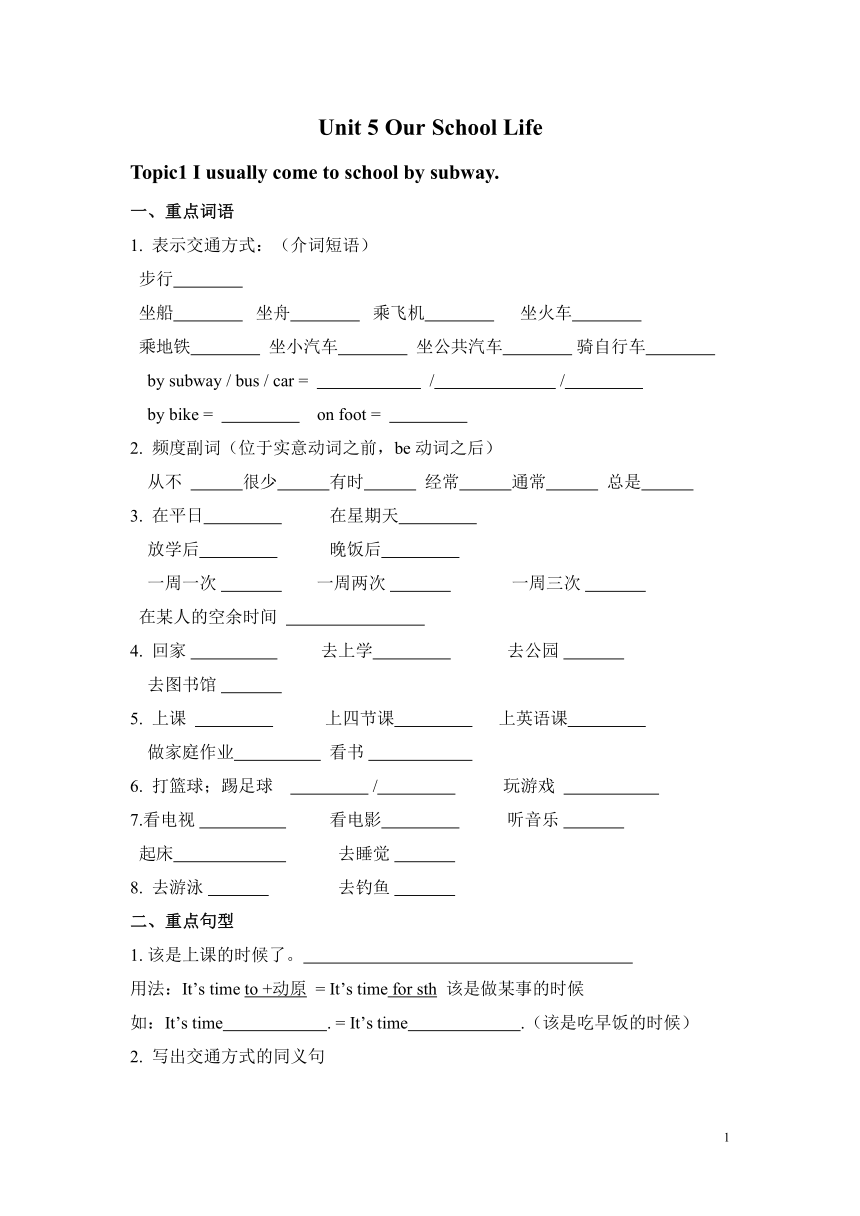 | |
| 格式 | zip | ||
| 文件大小 | 157.8KB | ||
| 资源类型 | 试卷 | ||
| 版本资源 | 仁爱科普版 | ||
| 科目 | 英语 | ||
| 更新时间 | 2020-07-04 18:36:52 | ||
图片预览

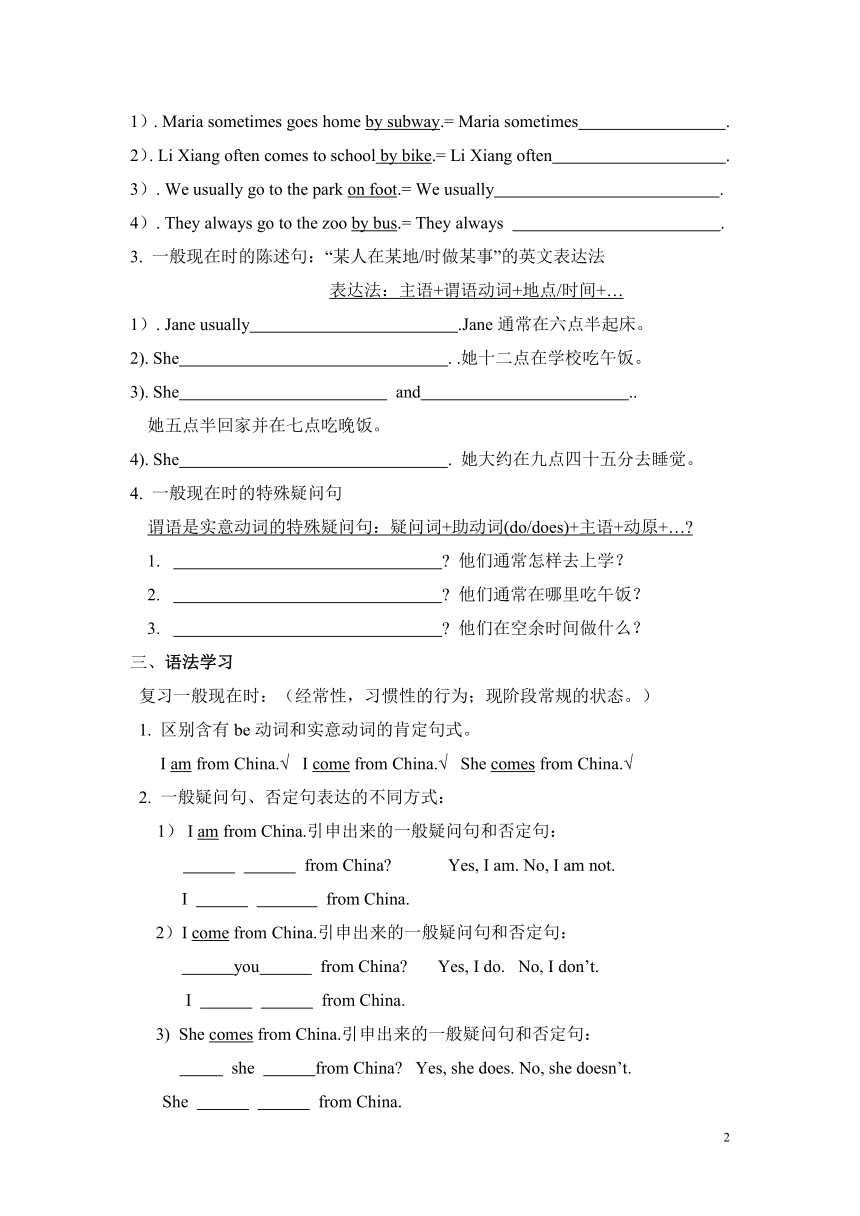
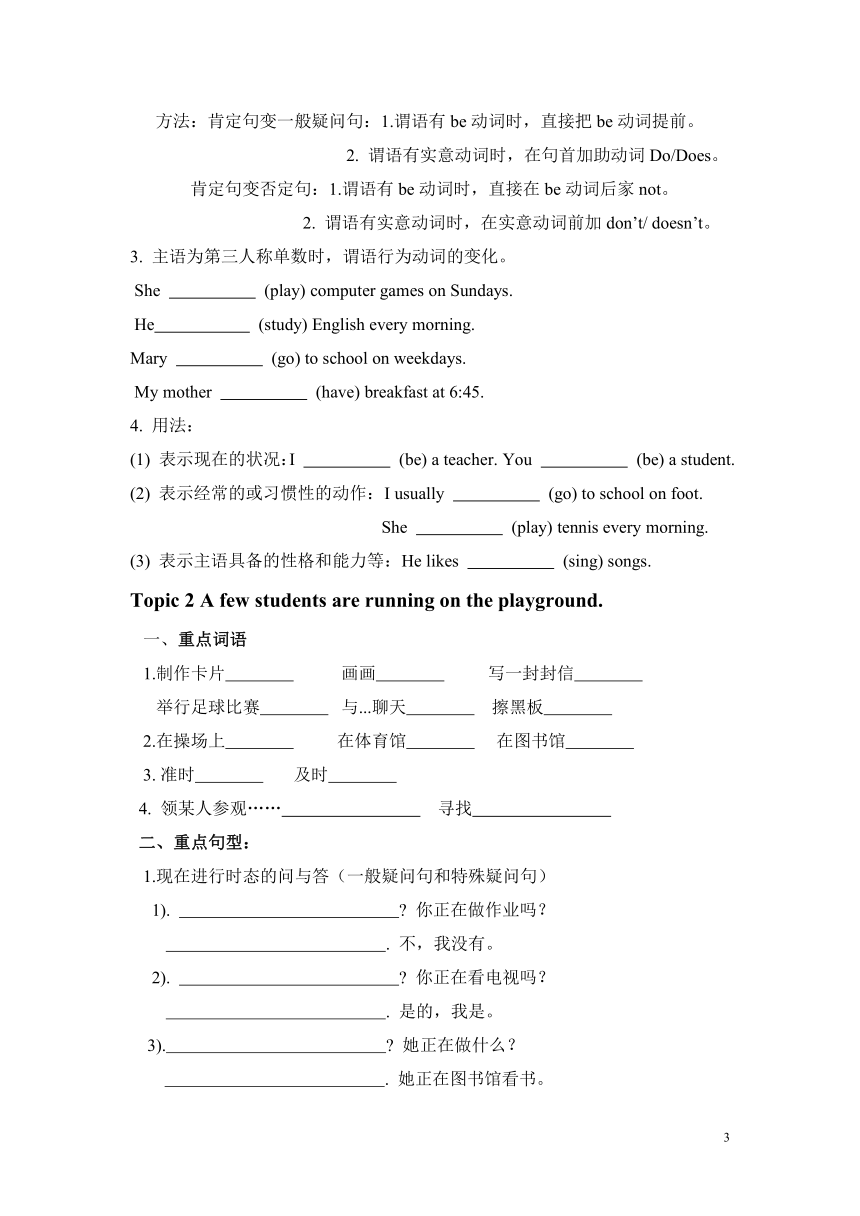
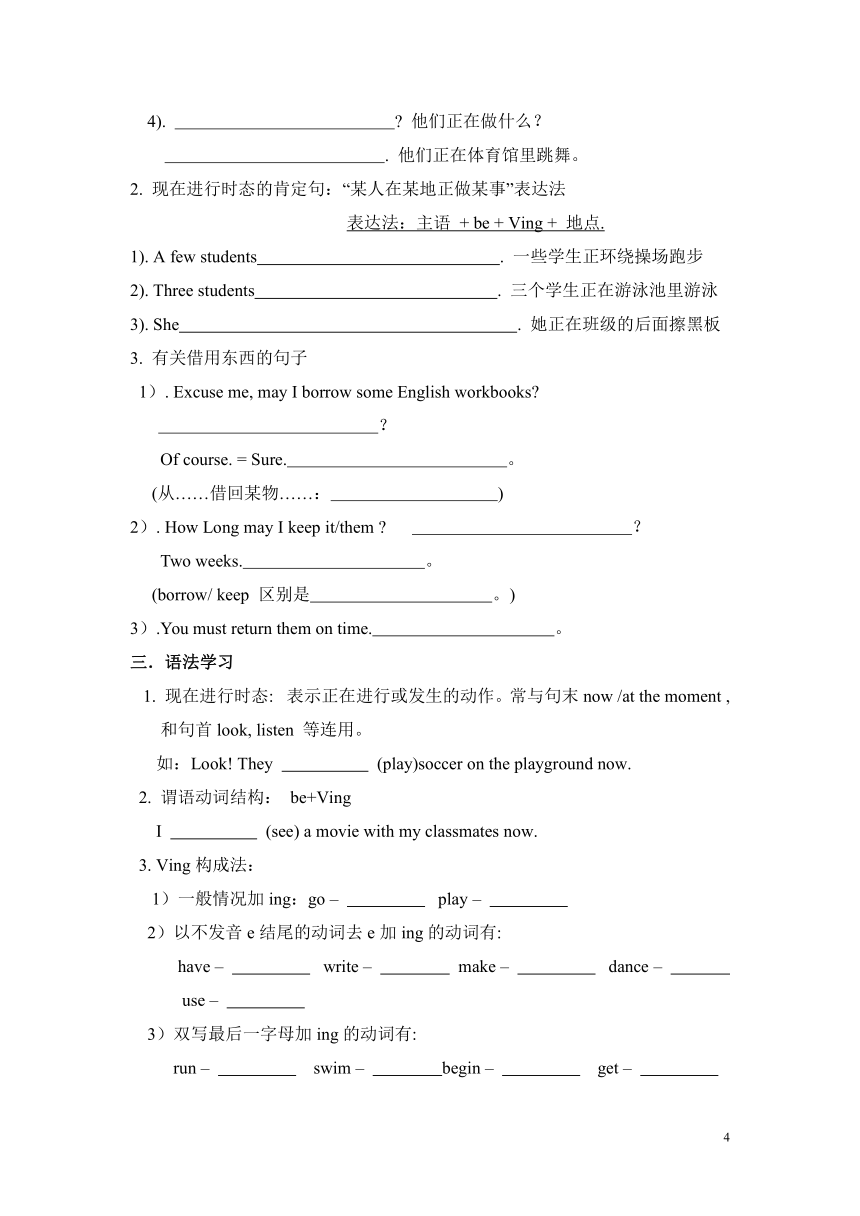
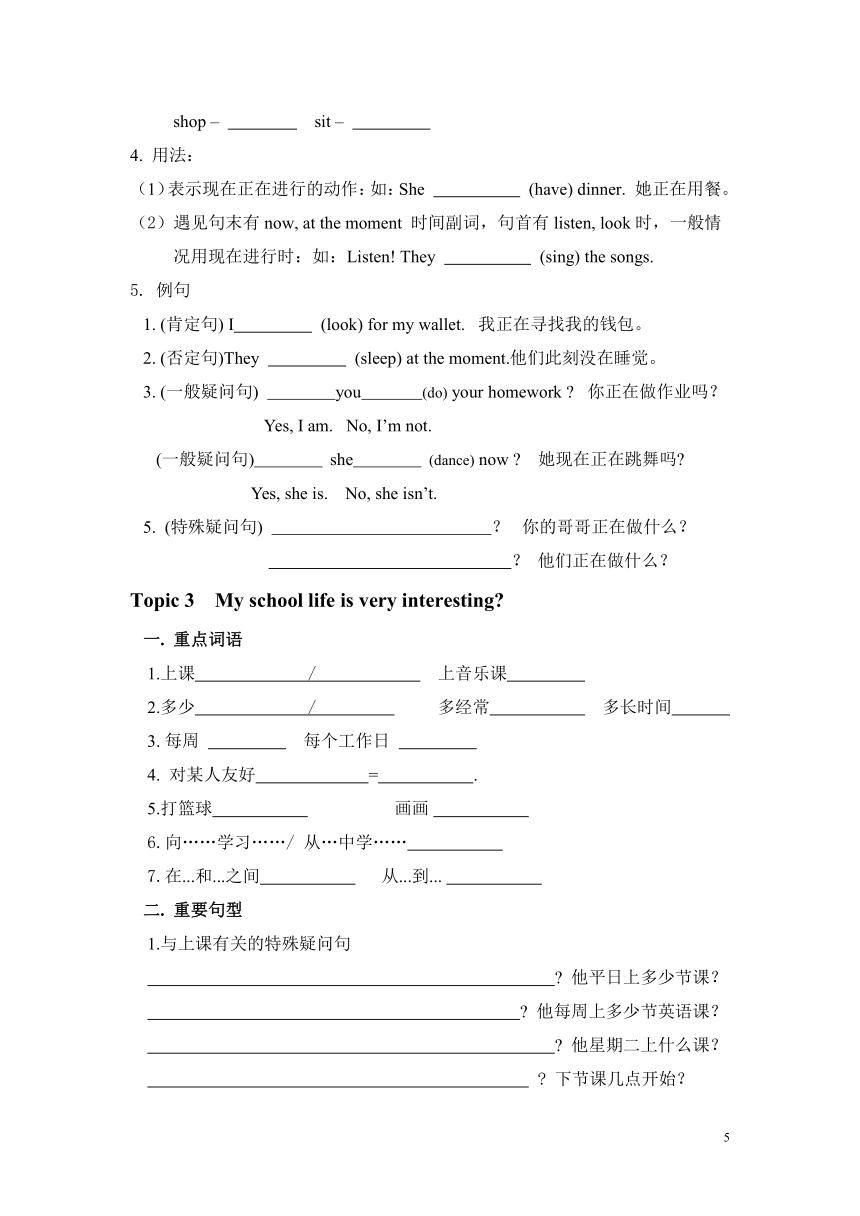
文档简介
Unit
5
Our
School
Life
Topic1
I
usually
come
to
school
by
subway.
一、重点词语
1.
表示交通方式:(介词短语)?
???
??步行
坐船
?
坐舟
???乘飞机
坐火车
?
乘地铁
坐小汽车
坐公共汽车
?骑自行车
by
subway
/
bus
/
car
=
/
?/
?
by
bike
=
on
foot
=
2.
频度副词(位于实意动词之前,be动词之后)
从不
很少
有时
经常
通常
总是
在平日
???
在星期天
?
放学后
??
晚饭后
?
一周一次?
一周两次?
一周三次?
在某人的空余时间
?
4.
回家?
去上学
??
?
去公园?
去图书馆?
5.
上课
上四节课
上英语课
做家庭作业
看书?
6.??打篮球;踢足球
?/
?
玩游戏
7.看电视?
看电影
??
?
听音乐?
起床
去睡觉?
8.
去游泳?
去钓鱼?
二、重点句型
1.?该是上课的时候了。
用法:It’s
time
to
+动原
=
It’s
time
for
sth
该是做某事的时候
如:It’s
time
.
=
It’s
time
.(该是吃早饭的时候)
2.
写出交通方式的同义句
1).
Maria
sometimes
goes
home
by
subway.=
Maria
sometimes
.
2).
Li
Xiang
often
comes
to
school
by
bike.=
Li
Xiang
often
.
3).
We
usually
go
to
the
park
on
foot.=
We
usually
.
4).
They
always
go
to
the
zoo
by
bus.=
They
always
.
3.
一般现在时的陈述句:“某人在某地/时做某事”的英文表达法
表达法:主语+谓语动词+地点/时间+…
1).
Jane
usually
.Jane通常在六点半起床。
2).
She
.
.她十二点在学校吃午饭。
3).
She
and
..
她五点半回家并在七点吃晚饭。
4).
She
.
她大约在九点四十五分去睡觉。
4.
一般现在时的特殊疑问句
谓语是实意动词的特殊疑问句:疑问词+助动词(do/does)+主语+动原+…?
?
他们通常怎样去上学??
?
他们通常在哪里吃午饭?
?
他们在空余时间做什么?
语法学习
复习一般现在时:(经常性,习惯性的行为;现阶段常规的状态。)
1.
区别含有be动词和实意动词的肯定句式。
??
?I
am
from
China.√
?I
come
from
China.√
?She
comes
from
China.√
2.
一般疑问句、否定句表达的不同方式:
1)?I
am
from
China.引申出来的一般疑问句和否定句:
?
?
from
China????
Yes,
I
am.
No,
I
am
not.
I
from
China.
2)I
come
from
China.引申出来的一般疑问句和否定句:
you
from
China??
Yes,
I
do.?
No,
I
don’t.
?I
from
China.?
She
comes
from
China.引申出来的一般疑问句和否定句:
she
from
China????Yes,
she
does.
No,
she
doesn’t.
She
from
China.
方法:肯定句变一般疑问句:1.谓语有be动词时,直接把be动词提前。
2.
谓语有实意动词时,在句首加助动词Do/Does。
肯定句变否定句:1.谓语有be动词时,直接在be动词后家not。
2.
谓语有实意动词时,在实意动词前加don’t/
doesn’t。
3.
主语为第三人称单数时,谓语行为动词的变化。
?She
(play)
computer
games
on
Sundays.?
?He
(study)
English
every
morning.
Mary
(go)
to
school
on
weekdays.
?My
mother
(have)
breakfast
at
6:45.
4.
用法:?
(1)
表示现在的状况:I
(be)
a
teacher.
You
(be)
a
student.
(2)
表示经常的或习惯性的动作:I
usually
(go)
to
school
on
foot.
She
(play)
tennis
every
morning.
(3)
表示主语具备的性格和能力等:He
likes
(sing)
songs.
Topic
2
A
few
students
are
running
on
the
playground.
重点词语
1.制作卡片
???
画画
写一封封信
?
举行足球比赛
?
与...聊天
擦黑板
?
2.在操场上
??
在体育馆
???
在图书馆
3.?准时
?
及时
?
4.
领某人参观……
寻找
二、重点句型:
1.现在进行时态的问与答(一般疑问句和特殊疑问句)
1).
?
你正在做作业吗?
.
不,我没有。
2).
?
你正在看电视吗?
.
是的,我是。
3).
?
她正在做什么?
.
她正在图书馆看书。
4).
?
他们正在做什么?
.
他们正在体育馆里跳舞。
2.
现在进行时态的肯定句:“某人在某地正做某事”表达法
表达法:主语
+
be
+
Ving
+
地点.
1).
A
few
students
.
一些学生正环绕操场跑步
2).
Three
students
.
三个学生正在游泳池里游泳
3).
She
.
她正在班级的后面擦黑板
3.
有关借用东西的句子
1).
Excuse
me,
may
I
borrow
some
English
workbooks?
?
Of
course.
=
Sure.
。
(从……借回某物……:
)
2).
How
Long
may
I
keep
it/them
?
?
Two
weeks.
。
(borrow/
keep
区别是
。)
3).You
must
return
them
on
time.
。
三.语法学习
1.
现在进行时态:?
表示正在进行或发生的动作。常与句末now
/at
the
moment
,
和句首look,
listen
等连用。
如:Look!
They
(play)soccer
on
the
playground
now.
2.
谓语动词结构:
be+Ving
I
(see)
a
movie
with
my
classmates
now.
3.
Ving构成法:
?
1)一般情况加ing:go
–
?play
–
2)以不发音e结尾的动词去e加ing的动词有:
?have
–
?write
–
make
–
?dance
–
use
–
双写最后一字母加ing的动词有:?
run
–
??
swim
–
begin
–
get
–
shop
–
sit
–
4.
用法:
(1)表示现在正在进行的动作:如:She
(have)
dinner.
她正在用餐。
遇见句末有now,
at
the
moment
时间副词,句首有listen,
look时,一般情
况用现在进行时:如:Listen!
They
(sing)
the
songs.
5.
例句
1.
(肯定句)
I
(look)
for
my
wallet.???我正在寻找我的钱包。??
???
2.
(否定句)They
(sleep)
at
the
moment.他们此刻没在睡觉。
3.
(一般疑问句)
you
(do)
your
homework
??
你正在做作业吗?
Yes,
I
am.?
No,
I’m
not.
(一般疑问句)
she
(dance)
now
???
她现在正在跳舞吗?
Yes,
she
is.??
No,
she
isn’t.
(特殊疑问句)
?
?你的哥哥正在做什么?
?
他们正在做什么?
Topic
3
My
school
life
is
very
interesting?
一.
重点词语
1.上课
/
上音乐课
?
2.多少
/
多经常
多长时间
3.?每周
每个工作日
?
4.
对某人友好
=
.
5.打篮球
画画?
6.向……学习……/
从…中学……
7.在...和...之间
从...到...?
二.
重要句型
1.与上课有关的特殊疑问句
?
他平日上多少节课?
?
他每周上多少节英语课?
?
他星期二上什么课?
?
下节课几点开始?
2.
??
=
?
你最喜欢什么科目?
.
=
.
我最喜欢的科目是历史。
句型:Which
…
do
you
like
best?
I
like
…
best.
What’s
your
favorite
…?
My
favorite
…is…
3.
?
=
?
你觉得它怎么样?
4.
翻译与校园生活有关的句子
1)I
have
four
classes
in
the
morning
and
two
classes
in
the
afternoon.
。
2)I
also
like
PE
and
music.
But
I
don’t
like
math
very
much.
。
3)After
school,
I
often
play
basketball
with
my
classmates.
。
4)I
go
to
the
school
library
every
Tuesday
and
Thursday.
。
三、语法内容
1、一般现在时和现在进行时及它们之间的区别
Ⅰ?概念不同
一般现在时表示经常的、习惯性的动作或存在的状态;也表示说话者的态度、能力或自然现象等等。
如:
He
often
(help)
others.(习惯)
I
can
(sing)
in
English.(能力)
The
earth
(go)
round
the
sun(自然现象).
现在进行时表示说话时(瞬间)正在进行的动作,或现阶段一直进行的动作。
如:He
(listen)
to
the
teacher
now.
Look!
They
(talk)
to
their
English
teacher
.
Ⅱ?构成不同
⑴.一般现在时有以下几种结构:
be型。谓语动词只有am,
is或are。be作连系动词。
如:
They
(be)
in
the
same
class.
实意动词型。谓语动词由实意动词的原形或第三人称单数形式构成。
如:
I
usually
(get)
up
at
half
past
five
in
the
morning.
He
(work)
in
a
TV
factory.
情态动词型。谓语动词由“情态动词can/may/must+动词原形”构成。
如:
I
(can
take)
it
to
the
classroom.
⑵.现在进行时由“be
动词
am/is/are+v-ing”构成。
如:
I
(write)
now.
We
(clean)
the
classroom
at
the
moment.
Ⅲ?时间状语不同
⑴与一般现在时连用的时间状语有:often,
usually,
sometimes,
always,
at
eight(o’clock),
in
the
morning/afternoon/evening,
on
Sunday(s),on
weekdays,
every
week/month/year/…,等等。
如:
We
always
(walk)
to
school.
My
sister
(go)
shopping
every
Sunday
evening.
⑵.与现在进行时连用的时间状语有:now,
at
the
moment,等等。
如:
She
(study)
English
now.
They
(run)
around
the
playground
at
the
moment.
答案:Unit
5
Our
School
Life
Topic1
I
usually
come
to
school
by
subway.
一、重点词语
1.
表示交通方式:(介词短语)?
???
??步行
on
foot
坐船
by
ship
坐舟
by
boat
??乘飞机
by
plane
坐火车
by
train
乘地铁
by
subway
坐小汽车
by
car
坐公共汽车by
bus
?骑自行车
by
bike
by
subway
/
bus
/
car
=
take
the
subway
/
take
a
bus
?/take
a
car
by
bike
=
ride
a
bike
on
foot
=
walk
(to)
2.
频度副词(位于实意动词之前,be动词之后)
从不
never很少
seldom
有时sometime
经常often
通常usually总是always
在平日
on
weekday
???
在星期天
on
Sunday
?
放学后
after
school
??
晚饭后
after
dinner
?
一周一次?once
a
week
一周两次?
twice
a
week
一周三次?
three
times
a
week
在某人的空余时间
in
one's
free
time
?
4.
回家?
go
home
去上学
go
to
school
去公园?
go
to
the
park
去图书馆?
go
to
the
library
5.
上课
have
a
class上四节课have
four
classes
上英语课have
an
English
classes
做家庭作业
do
one’s
homework
看书?
read
a
book
6.??打篮球;踢足球
play
basketball/play
football
玩游戏
play
games
7.看电视?
watch
TV
看电影
see
a
movie
听音乐?
listen
to
music
起床
get
up
去睡觉?
go
to
bed
8.
去游泳?
go
swimming
去钓鱼?
go
fishing
二、重点句型
1.?该是上课的时候了。
It's
time
for
class
用法:It’s
time
to
+动原
=
It’s
time
for
sth
该是做某事的时候
如:It’s
time
to
have
breakfast
.
=
It’s
time
for
breakfast
.(该是吃早饭的时候)
2.
写出交通方式的同义句
1).
Maria
sometimes
goes
home
by
subway.=
Maria
sometimes
takes
the
subway
home.
2).
Li
Xiang
often
comes
to
school
by
bike.=
Li
Xiang
often
rides
the
bike
to
school
.
3).
We
usually
go
to
the
park
on
foot.=
We
usually
walk
to
the
park
.
4).
They
always
go
to
the
zoo
by
bus.=
They
always
take
a
bus
to
the
zoo
.
3.
一般现在时的陈述句:“某人在某地/时做某事”的英文表达法
表达法:主语+谓语动词+地点/时间+…
1)
Jane
usually
gets
up
at
half
past
six
.Jane通常在六点半起床。
2)
She
has
lunch
in
school
at
twelve
.
她十二点在学校吃午饭。
谓语是实意动词的特殊疑问句:疑问词+助动词(do/does)+主语+动原+…?
How
do
they
usually
go
school
?
他们通常怎样去上学??
Where
do
they
usually
have
lunch
?
他们通常在哪里吃午饭?
What
do
they
do
in
their
free
time
?
他们在空余时间做什么?
语法学习
复习一般现在时:(经常性,习惯性的行为;现阶段常规的状态。)
1.
区别含有be动词和实意动词的肯定句式。
??
?I
am
from
China.√
?I
come
from
China.√
?She
comes
from
China.√
2.
一般疑问句、否定句表达的不同方式:
1)?I
am
from
China.引申出来的一般疑问句和否定句:
?
?
Are
you
from
China????
Yes,
I
am.
No,
I
am
not.
I
am
not
from
China.
2)I
come
from
China.引申出来的一般疑问句和否定句:
Do
you
come
from
China??
Yes,
I
do.?
No,
I
don’t.
?I
don't
come
from
China.?
She
comes
from
China.引申出来的一般疑问句和否定句:
Dose
she
come
from
China????Yes,
she
does.
No,
she
doesn’t.
She
doesn't
come
from
China.
方法:肯定句变一般疑问句:1.谓语有be动词时,直接把be动词提前。
2.
谓语有实意动词时,在句首加助动词Do/Does。
肯定句变否定句:1.谓语有be动词时,直接在be动词后家not。
2.
谓语有实意动词时,在实意动词前加don’t/
doesn’t。
3.
主语为第三人称单数时,谓语行为动词的变化。
?She
plays
(play)
computer
games
on
Sundays.?
?He
studies
(study)
English
every
morning.
Mary
goes
(go)
to
school
on
weekdays.
?My
mother
has
(have)
breakfast
at
6:45.
4.
用法:?
(1)
表示现在的状况:I
am
(be)
a
teacher.
You
are
(be)
a
student.
(2)
表示经常的或习惯性的动作:I
usually
go
(go)
to
school
on
foot.
She
plays
(play)
tennis
every
morning.
(3)
表示主语具备的性格和能力等:He
likes
singing
(sing)
songs.
Topic
2
A
few
students
are
running
on
the
playground.
重点词语
1.制作卡片
make
cards
画画
draw
pictures
写一封封信
write
a
letter
?
举行足球比赛have
a
soccer
game
与...聊天
chat
with
擦黑板
clean
the
blackboard
2.在操场上
on
the
playground
在体育馆
in
the
gym
在图书馆
in
the
library
3.?准时
on
time
?
及时
in
time
?
4.
领某人参观……
show
sb.
around
寻找
look
for
二、重点句型:
1.现在进行时态的问与答(一般疑问句和特殊疑问句)
1).
Are
you
doing
homework
?
你正在做作业吗?
No
I'm
not
.
不,我没有。
2).
Are
you
watching
TV
?
你正在看电视吗?
Yes,
I
am
.
是的,我是。
3).
what
is
she
doing
?
她正在做什么?
She
is
reading
in
the
library
.
她正在图书馆看书。
4).
what
are
they
doing
?
他们正在做什么?
They
are
dancing
in
the
gym
.
他们正在体育馆里跳舞。泳
Of
course.
=
Sure.
当然
。
(从……借回某物……:
borrow
sth
from...
)
2).
How
Long
may
I
keep
it/them
?
我可以保存多长时间
?
Two
weeks.
两周
。
(borrow/
keep
区别是
borrow短暂性动词,keep延续性动词
。)
3).You
must
return
them
on
time.
你必须按时归还
。
三.语法学习
1.
现在进行时态:?
表示正在进行或发生的动作。常与句末now
/at
the
moment
,
和句首look,
listen
等连用。
如:Look!
They
are
playing
(play)soccer
on
the
playground
now.
2.
谓语动词结构:
be+Ving
I
am
seeing
(see)
a
movie
with
my
classmates
now.
3.
Ving构成法:
?
1)一般情况加ing:go
–
going
?play
–
playing
2)以不发音e结尾的动词去e加ing的动词有:
?have
–
having
?write
–
writing
make
–
making
?dance
–
dancing
use
–
using
双写最后一字母加ing的动词有:?
run
–
running
??
swim
–
swimming
begin
–
beginning
get
–
getting
shop
–
shopping
sit
–
sitting
4.
用法:
(1)表示现在正在进行的动作:如:She
is
having
(have)
dinner.
她正在用餐。
遇见句末有now,
at
the
moment
时间副词,句首有listen,
look时,一般情
况用现在进行时:如:Listen!
They
are
singing
(sing)
the
songs.
5.
例句
1.
(肯定句)
I
am
looking
(look)
for
my
wallet.???我正在寻找我的钱包。??
???
2.
(否定句)They
are
not
sleeping
(sleep)
at
the
moment.他们此刻没在睡觉。
3.
(一般疑问句)
Are
you
doing
(do)
your
homework
??
你正在做作业吗?
Yes,
I
am.?
No,
I’m
not.
(一般疑问句)
Is
she
dancing
(dance)
now
???
她现在正在跳舞吗?
Yes,
she
is.??
No,
she
isn’t.
(特殊疑问句)
What's
your
brother
doing
?
?你的哥哥正在做什么?
What
are
they
doing
?
他们正在做什么?
Topic
3
My
school
life
is
very
interesting?
一.
重点词语
1.上课
have
a
class/
have
a
lesson
上音乐课
have
a
music
class
?
2.多少
how
many
/
how
much
多经常
how
often
多长时间
how
long
3.?每周
every
week
每个工作日
every
weekday
?
4.
对某人友好
be
kind
sb
=
be
friendly
to
.
5.打篮球
play
basketball
画画?
draw
pictures
6.向……学习……/
从…中学……
learn
...from...
7.在...和...之间
between...
and
...
从...到...?
from...
to...
二.
重要句型
1.与上课有关的特殊疑问句
How
many
classes
dose
he
have
every
weekdays
?
他平日上多少节课?
How
many
English
lessons
does
he
to
have
every
week
?
他每周上多少节英语课?
What
class
does
he
have
on
Wednesday
?
他星期二上什么课?
What
time
does
the
next
class
begin
?
下节课几点开始?
2.
What’s
your
favorite
subject?
??
=
Which
subject
do
you
like
best?
?
你最喜欢什么科目?
My
favorite
subject
us
history
.
=
I
like
history
best
.
我最喜欢的科目是历史。
句型:Which
…
do
you
like
best?
I
like
…
best.
What’s
your
favorite
…?
My
favorite
…is…
3.
What
do
you
think
of
it
?
=
How
do
you
like
it
?
你觉得它怎么样?
4.
翻译与校园生活有关的句子
1).I
have
four
classes
in
the
morning
and
two
classes
in
the
afternoon.
我上午上4节课下午上2节课
。
2).I
also
like
PE
and
music.
But
I
don’t
like
math
very
much.
我也喜欢体育和音乐,但是我非常不喜欢数学
。
3).After
school,
I
often
play
basketball
with
my
classmates.
放学后我经常和同学打篮球
。
4)I
go
to
the
school
library
every
Tuesday
and
Thursday.
我每周二和周四去图书馆
。
三、语法内容
1、一般现在时和现在进行时及它们之间的区别
Ⅰ?概念不同
一般现在时表示经常的、习惯性的动作或存在的状态;也表示说话者的态度、能力或自然现象等等。
如:
He
often
helps
(help)
others.(习惯)
I
can
sing
(sing)
in
English.(能力)
The
earth
goes
(go)
round
the
sun(自然现象).
现在进行时表示说话时(瞬间)正在进行的动作,或现阶段一直进行的动作。
如:He
is
listening
(listen)
to
the
teacher
now.
Look!
They
are
talking
(talk)
to
their
English
teacher
.
Ⅱ?构成不同
⑴.一般现在时有以下几种结构:
be型。谓语动词只有am,
is或are。be作连系动词。
如:
They
are
(be)
in
the
same
class.
实意动词型。谓语动词由实意动词的原形或第三人称单数形式构成。
如:
I
usually
get
(get)
up
at
half
past
five
in
the
morning.
He
works
(work)
in
a
TV
factory.
情态动词型。谓语动词由“情态动词can/may/must+动词原形”构成。
如:
I
can
take
(can
take)
it
to
the
classroom.
⑵.现在进行时由“be
动词
am/is/are+v-ing”构成。
如:
I
am
writing
(write)
now.
We
are
cleaning
(clean)
the
classroom
at
the
moment.
Ⅲ?时间状语不同
⑴与一般现在时连用的时间状语有:often,
usually,
sometimes,
always,
at
eight(o’clock),
in
the
morning/afternoon/evening,
on
Sunday(s),on
weekdays,
every
week/month/year/…,等等。
如:
We
always
walk
(walk)
to
school.
My
sister
goes
(go)
shopping
every
Sunday
evening.
⑵.与现在进行时连用的时间状语有:now,
at
the
moment,等等。
如:
She
is
studying
(study)
English
now.
They
are
running
(run)
around
the
playground
at
the
moment.
PAGE
4
5
Our
School
Life
Topic1
I
usually
come
to
school
by
subway.
一、重点词语
1.
表示交通方式:(介词短语)?
???
??步行
坐船
?
坐舟
???乘飞机
坐火车
?
乘地铁
坐小汽车
坐公共汽车
?骑自行车
by
subway
/
bus
/
car
=
/
?/
?
by
bike
=
on
foot
=
2.
频度副词(位于实意动词之前,be动词之后)
从不
很少
有时
经常
通常
总是
在平日
???
在星期天
?
放学后
??
晚饭后
?
一周一次?
一周两次?
一周三次?
在某人的空余时间
?
4.
回家?
去上学
??
?
去公园?
去图书馆?
5.
上课
上四节课
上英语课
做家庭作业
看书?
6.??打篮球;踢足球
?/
?
玩游戏
7.看电视?
看电影
??
?
听音乐?
起床
去睡觉?
8.
去游泳?
去钓鱼?
二、重点句型
1.?该是上课的时候了。
用法:It’s
time
to
+动原
=
It’s
time
for
sth
该是做某事的时候
如:It’s
time
.
=
It’s
time
.(该是吃早饭的时候)
2.
写出交通方式的同义句
1).
Maria
sometimes
goes
home
by
subway.=
Maria
sometimes
.
2).
Li
Xiang
often
comes
to
school
by
bike.=
Li
Xiang
often
.
3).
We
usually
go
to
the
park
on
foot.=
We
usually
.
4).
They
always
go
to
the
zoo
by
bus.=
They
always
.
3.
一般现在时的陈述句:“某人在某地/时做某事”的英文表达法
表达法:主语+谓语动词+地点/时间+…
1).
Jane
usually
.Jane通常在六点半起床。
2).
She
.
.她十二点在学校吃午饭。
3).
She
and
..
她五点半回家并在七点吃晚饭。
4).
She
.
她大约在九点四十五分去睡觉。
4.
一般现在时的特殊疑问句
谓语是实意动词的特殊疑问句:疑问词+助动词(do/does)+主语+动原+…?
?
他们通常怎样去上学??
?
他们通常在哪里吃午饭?
?
他们在空余时间做什么?
语法学习
复习一般现在时:(经常性,习惯性的行为;现阶段常规的状态。)
1.
区别含有be动词和实意动词的肯定句式。
??
?I
am
from
China.√
?I
come
from
China.√
?She
comes
from
China.√
2.
一般疑问句、否定句表达的不同方式:
1)?I
am
from
China.引申出来的一般疑问句和否定句:
?
?
from
China????
Yes,
I
am.
No,
I
am
not.
I
from
China.
2)I
come
from
China.引申出来的一般疑问句和否定句:
you
from
China??
Yes,
I
do.?
No,
I
don’t.
?I
from
China.?
She
comes
from
China.引申出来的一般疑问句和否定句:
she
from
China????Yes,
she
does.
No,
she
doesn’t.
She
from
China.
方法:肯定句变一般疑问句:1.谓语有be动词时,直接把be动词提前。
2.
谓语有实意动词时,在句首加助动词Do/Does。
肯定句变否定句:1.谓语有be动词时,直接在be动词后家not。
2.
谓语有实意动词时,在实意动词前加don’t/
doesn’t。
3.
主语为第三人称单数时,谓语行为动词的变化。
?She
(play)
computer
games
on
Sundays.?
?He
(study)
English
every
morning.
Mary
(go)
to
school
on
weekdays.
?My
mother
(have)
breakfast
at
6:45.
4.
用法:?
(1)
表示现在的状况:I
(be)
a
teacher.
You
(be)
a
student.
(2)
表示经常的或习惯性的动作:I
usually
(go)
to
school
on
foot.
She
(play)
tennis
every
morning.
(3)
表示主语具备的性格和能力等:He
likes
(sing)
songs.
Topic
2
A
few
students
are
running
on
the
playground.
重点词语
1.制作卡片
???
画画
写一封封信
?
举行足球比赛
?
与...聊天
擦黑板
?
2.在操场上
??
在体育馆
???
在图书馆
3.?准时
?
及时
?
4.
领某人参观……
寻找
二、重点句型:
1.现在进行时态的问与答(一般疑问句和特殊疑问句)
1).
?
你正在做作业吗?
.
不,我没有。
2).
?
你正在看电视吗?
.
是的,我是。
3).
?
她正在做什么?
.
她正在图书馆看书。
4).
?
他们正在做什么?
.
他们正在体育馆里跳舞。
2.
现在进行时态的肯定句:“某人在某地正做某事”表达法
表达法:主语
+
be
+
Ving
+
地点.
1).
A
few
students
.
一些学生正环绕操场跑步
2).
Three
students
.
三个学生正在游泳池里游泳
3).
She
.
她正在班级的后面擦黑板
3.
有关借用东西的句子
1).
Excuse
me,
may
I
borrow
some
English
workbooks?
?
Of
course.
=
Sure.
。
(从……借回某物……:
)
2).
How
Long
may
I
keep
it/them
?
?
Two
weeks.
。
(borrow/
keep
区别是
。)
3).You
must
return
them
on
time.
。
三.语法学习
1.
现在进行时态:?
表示正在进行或发生的动作。常与句末now
/at
the
moment
,
和句首look,
listen
等连用。
如:Look!
They
(play)soccer
on
the
playground
now.
2.
谓语动词结构:
be+Ving
I
(see)
a
movie
with
my
classmates
now.
3.
Ving构成法:
?
1)一般情况加ing:go
–
?play
–
2)以不发音e结尾的动词去e加ing的动词有:
?have
–
?write
–
make
–
?dance
–
use
–
双写最后一字母加ing的动词有:?
run
–
??
swim
–
begin
–
get
–
shop
–
sit
–
4.
用法:
(1)表示现在正在进行的动作:如:She
(have)
dinner.
她正在用餐。
遇见句末有now,
at
the
moment
时间副词,句首有listen,
look时,一般情
况用现在进行时:如:Listen!
They
(sing)
the
songs.
5.
例句
1.
(肯定句)
I
(look)
for
my
wallet.???我正在寻找我的钱包。??
???
2.
(否定句)They
(sleep)
at
the
moment.他们此刻没在睡觉。
3.
(一般疑问句)
you
(do)
your
homework
??
你正在做作业吗?
Yes,
I
am.?
No,
I’m
not.
(一般疑问句)
she
(dance)
now
???
她现在正在跳舞吗?
Yes,
she
is.??
No,
she
isn’t.
(特殊疑问句)
?
?你的哥哥正在做什么?
?
他们正在做什么?
Topic
3
My
school
life
is
very
interesting?
一.
重点词语
1.上课
/
上音乐课
?
2.多少
/
多经常
多长时间
3.?每周
每个工作日
?
4.
对某人友好
=
.
5.打篮球
画画?
6.向……学习……/
从…中学……
7.在...和...之间
从...到...?
二.
重要句型
1.与上课有关的特殊疑问句
?
他平日上多少节课?
?
他每周上多少节英语课?
?
他星期二上什么课?
?
下节课几点开始?
2.
??
=
?
你最喜欢什么科目?
.
=
.
我最喜欢的科目是历史。
句型:Which
…
do
you
like
best?
I
like
…
best.
What’s
your
favorite
…?
My
favorite
…is…
3.
?
=
?
你觉得它怎么样?
4.
翻译与校园生活有关的句子
1)I
have
four
classes
in
the
morning
and
two
classes
in
the
afternoon.
。
2)I
also
like
PE
and
music.
But
I
don’t
like
math
very
much.
。
3)After
school,
I
often
play
basketball
with
my
classmates.
。
4)I
go
to
the
school
library
every
Tuesday
and
Thursday.
。
三、语法内容
1、一般现在时和现在进行时及它们之间的区别
Ⅰ?概念不同
一般现在时表示经常的、习惯性的动作或存在的状态;也表示说话者的态度、能力或自然现象等等。
如:
He
often
(help)
others.(习惯)
I
can
(sing)
in
English.(能力)
The
earth
(go)
round
the
sun(自然现象).
现在进行时表示说话时(瞬间)正在进行的动作,或现阶段一直进行的动作。
如:He
(listen)
to
the
teacher
now.
Look!
They
(talk)
to
their
English
teacher
.
Ⅱ?构成不同
⑴.一般现在时有以下几种结构:
be型。谓语动词只有am,
is或are。be作连系动词。
如:
They
(be)
in
the
same
class.
实意动词型。谓语动词由实意动词的原形或第三人称单数形式构成。
如:
I
usually
(get)
up
at
half
past
five
in
the
morning.
He
(work)
in
a
TV
factory.
情态动词型。谓语动词由“情态动词can/may/must+动词原形”构成。
如:
I
(can
take)
it
to
the
classroom.
⑵.现在进行时由“be
动词
am/is/are+v-ing”构成。
如:
I
(write)
now.
We
(clean)
the
classroom
at
the
moment.
Ⅲ?时间状语不同
⑴与一般现在时连用的时间状语有:often,
usually,
sometimes,
always,
at
eight(o’clock),
in
the
morning/afternoon/evening,
on
Sunday(s),on
weekdays,
every
week/month/year/…,等等。
如:
We
always
(walk)
to
school.
My
sister
(go)
shopping
every
Sunday
evening.
⑵.与现在进行时连用的时间状语有:now,
at
the
moment,等等。
如:
She
(study)
English
now.
They
(run)
around
the
playground
at
the
moment.
答案:Unit
5
Our
School
Life
Topic1
I
usually
come
to
school
by
subway.
一、重点词语
1.
表示交通方式:(介词短语)?
???
??步行
on
foot
坐船
by
ship
坐舟
by
boat
??乘飞机
by
plane
坐火车
by
train
乘地铁
by
subway
坐小汽车
by
car
坐公共汽车by
bus
?骑自行车
by
bike
by
subway
/
bus
/
car
=
take
the
subway
/
take
a
bus
?/take
a
car
by
bike
=
ride
a
bike
on
foot
=
walk
(to)
2.
频度副词(位于实意动词之前,be动词之后)
从不
never很少
seldom
有时sometime
经常often
通常usually总是always
在平日
on
weekday
???
在星期天
on
Sunday
?
放学后
after
school
??
晚饭后
after
dinner
?
一周一次?once
a
week
一周两次?
twice
a
week
一周三次?
three
times
a
week
在某人的空余时间
in
one's
free
time
?
4.
回家?
go
home
去上学
go
to
school
去公园?
go
to
the
park
去图书馆?
go
to
the
library
5.
上课
have
a
class上四节课have
four
classes
上英语课have
an
English
classes
做家庭作业
do
one’s
homework
看书?
read
a
book
6.??打篮球;踢足球
play
basketball/play
football
玩游戏
play
games
7.看电视?
watch
TV
看电影
see
a
movie
听音乐?
listen
to
music
起床
get
up
去睡觉?
go
to
bed
8.
去游泳?
go
swimming
去钓鱼?
go
fishing
二、重点句型
1.?该是上课的时候了。
It's
time
for
class
用法:It’s
time
to
+动原
=
It’s
time
for
sth
该是做某事的时候
如:It’s
time
to
have
breakfast
.
=
It’s
time
for
breakfast
.(该是吃早饭的时候)
2.
写出交通方式的同义句
1).
Maria
sometimes
goes
home
by
subway.=
Maria
sometimes
takes
the
subway
home.
2).
Li
Xiang
often
comes
to
school
by
bike.=
Li
Xiang
often
rides
the
bike
to
school
.
3).
We
usually
go
to
the
park
on
foot.=
We
usually
walk
to
the
park
.
4).
They
always
go
to
the
zoo
by
bus.=
They
always
take
a
bus
to
the
zoo
.
3.
一般现在时的陈述句:“某人在某地/时做某事”的英文表达法
表达法:主语+谓语动词+地点/时间+…
1)
Jane
usually
gets
up
at
half
past
six
.Jane通常在六点半起床。
2)
She
has
lunch
in
school
at
twelve
.
她十二点在学校吃午饭。
谓语是实意动词的特殊疑问句:疑问词+助动词(do/does)+主语+动原+…?
How
do
they
usually
go
school
?
他们通常怎样去上学??
Where
do
they
usually
have
lunch
?
他们通常在哪里吃午饭?
What
do
they
do
in
their
free
time
?
他们在空余时间做什么?
语法学习
复习一般现在时:(经常性,习惯性的行为;现阶段常规的状态。)
1.
区别含有be动词和实意动词的肯定句式。
??
?I
am
from
China.√
?I
come
from
China.√
?She
comes
from
China.√
2.
一般疑问句、否定句表达的不同方式:
1)?I
am
from
China.引申出来的一般疑问句和否定句:
?
?
Are
you
from
China????
Yes,
I
am.
No,
I
am
not.
I
am
not
from
China.
2)I
come
from
China.引申出来的一般疑问句和否定句:
Do
you
come
from
China??
Yes,
I
do.?
No,
I
don’t.
?I
don't
come
from
China.?
She
comes
from
China.引申出来的一般疑问句和否定句:
Dose
she
come
from
China????Yes,
she
does.
No,
she
doesn’t.
She
doesn't
come
from
China.
方法:肯定句变一般疑问句:1.谓语有be动词时,直接把be动词提前。
2.
谓语有实意动词时,在句首加助动词Do/Does。
肯定句变否定句:1.谓语有be动词时,直接在be动词后家not。
2.
谓语有实意动词时,在实意动词前加don’t/
doesn’t。
3.
主语为第三人称单数时,谓语行为动词的变化。
?She
plays
(play)
computer
games
on
Sundays.?
?He
studies
(study)
English
every
morning.
Mary
goes
(go)
to
school
on
weekdays.
?My
mother
has
(have)
breakfast
at
6:45.
4.
用法:?
(1)
表示现在的状况:I
am
(be)
a
teacher.
You
are
(be)
a
student.
(2)
表示经常的或习惯性的动作:I
usually
go
(go)
to
school
on
foot.
She
plays
(play)
tennis
every
morning.
(3)
表示主语具备的性格和能力等:He
likes
singing
(sing)
songs.
Topic
2
A
few
students
are
running
on
the
playground.
重点词语
1.制作卡片
make
cards
画画
draw
pictures
写一封封信
write
a
letter
?
举行足球比赛have
a
soccer
game
与...聊天
chat
with
擦黑板
clean
the
blackboard
2.在操场上
on
the
playground
在体育馆
in
the
gym
在图书馆
in
the
library
3.?准时
on
time
?
及时
in
time
?
4.
领某人参观……
show
sb.
around
寻找
look
for
二、重点句型:
1.现在进行时态的问与答(一般疑问句和特殊疑问句)
1).
Are
you
doing
homework
?
你正在做作业吗?
No
I'm
not
.
不,我没有。
2).
Are
you
watching
TV
?
你正在看电视吗?
Yes,
I
am
.
是的,我是。
3).
what
is
she
doing
?
她正在做什么?
She
is
reading
in
the
library
.
她正在图书馆看书。
4).
what
are
they
doing
?
他们正在做什么?
They
are
dancing
in
the
gym
.
他们正在体育馆里跳舞。泳
Of
course.
=
Sure.
当然
。
(从……借回某物……:
borrow
sth
from...
)
2).
How
Long
may
I
keep
it/them
?
我可以保存多长时间
?
Two
weeks.
两周
。
(borrow/
keep
区别是
borrow短暂性动词,keep延续性动词
。)
3).You
must
return
them
on
time.
你必须按时归还
。
三.语法学习
1.
现在进行时态:?
表示正在进行或发生的动作。常与句末now
/at
the
moment
,
和句首look,
listen
等连用。
如:Look!
They
are
playing
(play)soccer
on
the
playground
now.
2.
谓语动词结构:
be+Ving
I
am
seeing
(see)
a
movie
with
my
classmates
now.
3.
Ving构成法:
?
1)一般情况加ing:go
–
going
?play
–
playing
2)以不发音e结尾的动词去e加ing的动词有:
?have
–
having
?write
–
writing
make
–
making
?dance
–
dancing
use
–
using
双写最后一字母加ing的动词有:?
run
–
running
??
swim
–
swimming
begin
–
beginning
get
–
getting
shop
–
shopping
sit
–
sitting
4.
用法:
(1)表示现在正在进行的动作:如:She
is
having
(have)
dinner.
她正在用餐。
遇见句末有now,
at
the
moment
时间副词,句首有listen,
look时,一般情
况用现在进行时:如:Listen!
They
are
singing
(sing)
the
songs.
5.
例句
1.
(肯定句)
I
am
looking
(look)
for
my
wallet.???我正在寻找我的钱包。??
???
2.
(否定句)They
are
not
sleeping
(sleep)
at
the
moment.他们此刻没在睡觉。
3.
(一般疑问句)
Are
you
doing
(do)
your
homework
??
你正在做作业吗?
Yes,
I
am.?
No,
I’m
not.
(一般疑问句)
Is
she
dancing
(dance)
now
???
她现在正在跳舞吗?
Yes,
she
is.??
No,
she
isn’t.
(特殊疑问句)
What's
your
brother
doing
?
?你的哥哥正在做什么?
What
are
they
doing
?
他们正在做什么?
Topic
3
My
school
life
is
very
interesting?
一.
重点词语
1.上课
have
a
class/
have
a
lesson
上音乐课
have
a
music
class
?
2.多少
how
many
/
how
much
多经常
how
often
多长时间
how
long
3.?每周
every
week
每个工作日
every
weekday
?
4.
对某人友好
be
kind
sb
=
be
friendly
to
.
5.打篮球
play
basketball
画画?
draw
pictures
6.向……学习……/
从…中学……
learn
...from...
7.在...和...之间
between...
and
...
从...到...?
from...
to...
二.
重要句型
1.与上课有关的特殊疑问句
How
many
classes
dose
he
have
every
weekdays
?
他平日上多少节课?
How
many
English
lessons
does
he
to
have
every
week
?
他每周上多少节英语课?
What
class
does
he
have
on
Wednesday
?
他星期二上什么课?
What
time
does
the
next
class
begin
?
下节课几点开始?
2.
What’s
your
favorite
subject?
??
=
Which
subject
do
you
like
best?
?
你最喜欢什么科目?
My
favorite
subject
us
history
.
=
I
like
history
best
.
我最喜欢的科目是历史。
句型:Which
…
do
you
like
best?
I
like
…
best.
What’s
your
favorite
…?
My
favorite
…is…
3.
What
do
you
think
of
it
?
=
How
do
you
like
it
?
你觉得它怎么样?
4.
翻译与校园生活有关的句子
1).I
have
four
classes
in
the
morning
and
two
classes
in
the
afternoon.
我上午上4节课下午上2节课
。
2).I
also
like
PE
and
music.
But
I
don’t
like
math
very
much.
我也喜欢体育和音乐,但是我非常不喜欢数学
。
3).After
school,
I
often
play
basketball
with
my
classmates.
放学后我经常和同学打篮球
。
4)I
go
to
the
school
library
every
Tuesday
and
Thursday.
我每周二和周四去图书馆
。
三、语法内容
1、一般现在时和现在进行时及它们之间的区别
Ⅰ?概念不同
一般现在时表示经常的、习惯性的动作或存在的状态;也表示说话者的态度、能力或自然现象等等。
如:
He
often
helps
(help)
others.(习惯)
I
can
sing
(sing)
in
English.(能力)
The
earth
goes
(go)
round
the
sun(自然现象).
现在进行时表示说话时(瞬间)正在进行的动作,或现阶段一直进行的动作。
如:He
is
listening
(listen)
to
the
teacher
now.
Look!
They
are
talking
(talk)
to
their
English
teacher
.
Ⅱ?构成不同
⑴.一般现在时有以下几种结构:
be型。谓语动词只有am,
is或are。be作连系动词。
如:
They
are
(be)
in
the
same
class.
实意动词型。谓语动词由实意动词的原形或第三人称单数形式构成。
如:
I
usually
get
(get)
up
at
half
past
five
in
the
morning.
He
works
(work)
in
a
TV
factory.
情态动词型。谓语动词由“情态动词can/may/must+动词原形”构成。
如:
I
can
take
(can
take)
it
to
the
classroom.
⑵.现在进行时由“be
动词
am/is/are+v-ing”构成。
如:
I
am
writing
(write)
now.
We
are
cleaning
(clean)
the
classroom
at
the
moment.
Ⅲ?时间状语不同
⑴与一般现在时连用的时间状语有:often,
usually,
sometimes,
always,
at
eight(o’clock),
in
the
morning/afternoon/evening,
on
Sunday(s),on
weekdays,
every
week/month/year/…,等等。
如:
We
always
walk
(walk)
to
school.
My
sister
goes
(go)
shopping
every
Sunday
evening.
⑵.与现在进行时连用的时间状语有:now,
at
the
moment,等等。
如:
She
is
studying
(study)
English
now.
They
are
running
(run)
around
the
playground
at
the
moment.
PAGE
4
同课章节目录
- Unit 5 Our school life
- Topic 1 I usually come to school by subway.
- Topic 2 A few students are running around the play
- Topic 3 My school life is very interesting.
- Unit 6 Our local area
- Topic 1 Is there a computer in your study?
- Topic 2 My home is in an apartment building.
- Topic 3 Which is the way to the hospital?
- Review of Units 5-6
- Unit 7 The Birthday
- Topic 1 When is your birthday?
- Topic 2 Can you sing an English song?
- Topic 3 Everyone had a good time.
- Unit 8 The seasons and the Weathe
- Topic 1 What's the weather like in summer?
- Topic 2 The summer holidays are coming.
- Topic 3 Let’s celebrate!
- Review of Units 7-8
- 旧版资料
- Unit 5 Our School Life
- Unit 6 Our Local Area
- Unit 7 The Birthday
- Unit 8 The seasons and the Weathe
- Unit 7 Celebrating the Birthday(老版本)
